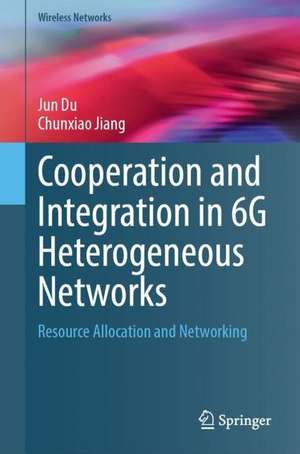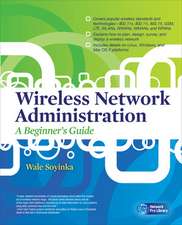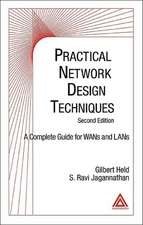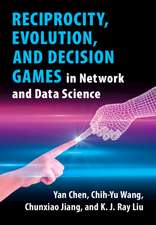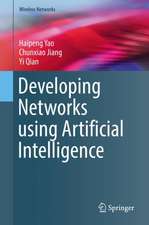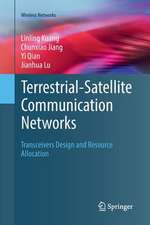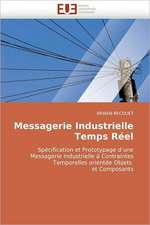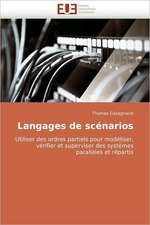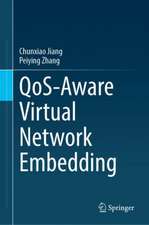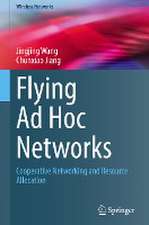Cooperation and Integration in 6G Heterogeneous Networks: Resource Allocation and Networking: Wireless Networks
Autor Jun Du, Chunxiao Jiangen Limba Engleză Hardback – 9 dec 2022
The book addresses a range of technical issues in cooperative resource allocation and information sharing for the future 6G heterogenous networks, from the terrestrial ultra-dense networks and space-based networks to the integrated satellite-terrestrial networks, as well as introducing the effects of cooperative behavior among mobile users on increasing capacity, trustworthiness and privacy. For the cooperative transmission in heterogeneous networks, the authors commence with the traffic offloading problems in terrestrial ultra-dense networks, and the cognitive and cooperative mechanisms in heterogeneous space-based networks, the stability analysis of which is also provided. Moreover, for the cooperative transmission in integrated satellite-terrestrial networks, the authors present a pair of dynamic and adaptive resource allocation strategies for traffic offloading, cooperative beamforming and traffic prediction based cooperative transmission. Later, the authors discuss the cooperative computation and caching resource allocation in heterogeneous networks, with the highlight of providing our current studies on the game theory, auction theory and deep reinforcement learning based approaches. Meanwhile, theauthors introduce the cooperative resource and information sharing among users, in which capacity oriented-, trustworthiness oriented-, and privacy oriented cooperative mechanisms are investigated. Finally, the conclusion is drawn.
| Toate formatele și edițiile | Preț | Express |
|---|---|---|
| Paperback (1) | 1280.52 lei 6-8 săpt. | |
| Springer Nature Singapore – 9 dec 2023 | 1280.52 lei 6-8 săpt. | |
| Hardback (1) | 1287.12 lei 6-8 săpt. | |
| Springer Nature Singapore – 9 dec 2022 | 1287.12 lei 6-8 săpt. |
Din seria Wireless Networks
- 20%
 Preț: 584.46 lei
Preț: 584.46 lei - 20%
 Preț: 798.30 lei
Preț: 798.30 lei - 18%
 Preț: 1218.06 lei
Preț: 1218.06 lei - 20%
 Preț: 985.86 lei
Preț: 985.86 lei - 20%
 Preț: 865.29 lei
Preț: 865.29 lei - 20%
 Preț: 1165.69 lei
Preț: 1165.69 lei - 15%
 Preț: 642.51 lei
Preț: 642.51 lei -
 Preț: 385.84 lei
Preț: 385.84 lei - 15%
 Preț: 636.80 lei
Preț: 636.80 lei - 20%
 Preț: 1046.06 lei
Preț: 1046.06 lei -
 Preț: 390.00 lei
Preț: 390.00 lei - 18%
 Preț: 727.66 lei
Preț: 727.66 lei - 18%
 Preț: 895.76 lei
Preț: 895.76 lei - 18%
 Preț: 1004.19 lei
Preț: 1004.19 lei - 15%
 Preț: 633.02 lei
Preț: 633.02 lei -
 Preț: 457.03 lei
Preț: 457.03 lei - 20%
 Preț: 306.62 lei
Preț: 306.62 lei - 20%
 Preț: 646.80 lei
Preț: 646.80 lei - 15%
 Preț: 633.02 lei
Preț: 633.02 lei - 18%
 Preț: 730.16 lei
Preț: 730.16 lei - 18%
 Preț: 889.92 lei
Preț: 889.92 lei - 20%
 Preț: 816.22 lei
Preț: 816.22 lei - 15%
 Preț: 640.71 lei
Preț: 640.71 lei - 20%
 Preț: 646.36 lei
Preț: 646.36 lei - 18%
 Preț: 727.00 lei
Preț: 727.00 lei - 18%
 Preț: 726.55 lei
Preț: 726.55 lei - 18%
 Preț: 781.94 lei
Preț: 781.94 lei - 20%
 Preț: 553.25 lei
Preț: 553.25 lei - 18%
 Preț: 892.11 lei
Preț: 892.11 lei - 18%
 Preț: 1008.12 lei
Preț: 1008.12 lei - 18%
 Preț: 724.80 lei
Preț: 724.80 lei - 20%
 Preț: 1295.86 lei
Preț: 1295.86 lei - 20%
 Preț: 757.81 lei
Preț: 757.81 lei - 24%
 Preț: 794.50 lei
Preț: 794.50 lei - 20%
 Preț: 645.79 lei
Preț: 645.79 lei - 24%
 Preț: 683.51 lei
Preț: 683.51 lei - 20%
 Preț: 647.13 lei
Preț: 647.13 lei - 20%
 Preț: 988.48 lei
Preț: 988.48 lei - 18%
 Preț: 727.48 lei
Preț: 727.48 lei - 20%
 Preț: 1162.37 lei
Preț: 1162.37 lei - 18%
 Preț: 778.13 lei
Preț: 778.13 lei - 20%
 Preț: 643.30 lei
Preț: 643.30 lei - 24%
 Preț: 834.80 lei
Preț: 834.80 lei - 20%
 Preț: 563.10 lei
Preț: 563.10 lei
Preț: 1287.12 lei
Preț vechi: 1608.90 lei
-20% Nou
Puncte Express: 1931
Preț estimativ în valută:
246.30€ • 263.37$ • 205.35£
246.30€ • 263.37$ • 205.35£
Carte tipărită la comandă
Livrare economică 17 aprilie-01 mai
Preluare comenzi: 021 569.72.76
Specificații
ISBN-13: 9789811976476
ISBN-10: 9811976473
Pagini: 460
Ilustrații: XVI, 460 p. 1 illus.
Dimensiuni: 155 x 235 mm
Greutate: 0.84 kg
Ediția:1st ed. 2023
Editura: Springer Nature Singapore
Colecția Springer
Seria Wireless Networks
Locul publicării:Singapore, Singapore
ISBN-10: 9811976473
Pagini: 460
Ilustrații: XVI, 460 p. 1 illus.
Dimensiuni: 155 x 235 mm
Greutate: 0.84 kg
Ediția:1st ed. 2023
Editura: Springer Nature Singapore
Colecția Springer
Seria Wireless Networks
Locul publicării:Singapore, Singapore
Cuprins
Chapter 1 Introduction of 6G Heterogeneous Networks.- Chapter 2 Introduction of Cooperative Transmission in Heterogeneous Networks.- Chapter 3 Traffic Offloading in Heterogeneous Networks.- Chapter 4 Cooperative Resource Allocation in Heterogeneous Space-based Networks.- Chapter 5 Introduction of Cooperative Transmission in Integrated Satellite-Terrestrial Networks.- Chapter 6 Traffic Offloading in Satellite-Terrestrial Network.- Chapter 7 Cooperative Beamforming for Secure Satellite-Terrestrial Transmission.- Chapter 8 Traffic Prediction based Transmission in Satellite-Terrestrial Networks.- Chapter 9 Introduction of Cooperative Computation and Caching.- Chapter 10 QoS-Aware Computational Resource Allocation.- Chapter 11 QoS-Aware Caching Resource Allocation.- Chapter 12 Priority-Aware Computational Resource Allocation.- Chapter 13 Energy-Aware Computational Resource Allocation.- Chapter 14 Introduction of Cooperative Resource and Information Sharing.- Chapter 15 Cooperative Data Transaction in Mobile Networks.- Chapter 16 Cooperative Trustworthiness Evaluation and Trustworthy Service Rating.- Chapter 17 Cooperative Privacy Protection Among Mobile User.- Chapter 18 Conclusion.
Notă biografică
Jun Du received her B.S. in information and communication engineering from Beijing Institute of Technology, in 2009, and her M.S. and Ph.D. in information and communication engineering from Tsinghua University, Beijing, in 2014 and 2018, respectively. From Oct. 2016 to Sept. 2017, Dr. Du was a sponsored researcher, and she visited Imperial College London. Currently she is an assistant professor in the Department of Electrical Engineering, Tsinghua University. Her research interests are mainly in communication, networking, resource allocation, and system security problems of heterogeneous networks and space-based information networks. She has authored/co-authored 70+ technical papers in renowned international journals and conferences, including 30+ renowned IEEE journal papers. Dr. Du is the recipient of the Best Student Paper Award from IEEE Global SIP in 2015, the Best Paper Award from IEEE ICC 2019, the Best Paper Award from IWCMC in 2020, and the WuWenJun Young Elite Scientist Award from CAAI in 2020.Chunxiao Jiang is an associate professor in the School of Information Science and Technology, Tsinghua University. He received his B.S. degree in information engineering from Beihang University, Beijing, in 2008 and his Ph.D. degree in electronic engineering from Tsinghua University, Beijing, in 2013, both with the highest honors. His research interests include application of game theory, optimization, and statistical theories to communication, networking, and resource allocation problems, in particular space networks and heterogeneous networks. Dr. Jiang has served as an Editor of IEEE Internet of Things Journal, IEEE Network, IEEE Communications Letters, and a Guest Editor of IEEE Communications Magazine, IEEE Transactions on Network Science and Engineering and IEEE Transactions on Cognitive Communications and Networking. He has also served as a member of the technical program committee as well as the Symposium Chair for a number of international conferences, including IEEE CNS 2020 Publication Chair, IEEE WCSP 2019 Symposium Chair, IEEE ICC 2018 Symposium Co-Chair, IWCMC 2020/19/18 Symposium Chair, WiMob 2018 Publicity Chair, ICCC 2018 Workshop Co-Chair, and ICC 2017 Workshop Co-Chair. Dr. Jiang is the recipient of the Best Paper Award from IEEE GLOBECOM in 2013, the Best Student Paper Award from IEEE GlobalSIP in 2015, IEEE Communications Society Young Author Best Paper Award in 2017, the Best Paper Award IWCMC in 2017, IEEE ComSoc TC Best Journal Paper Award of the IEEE ComSoc TC on Green Communications & Computing 2018, IEEE ComSoc TC Best Journal Paper Award of the IEEE ComSoc TC on Communications Systems Integration and Modeling 2018, the Best Paper Award from ICC 2019, IEEE VTS Early Career Award 2020. He received the Chinese National Second Prize in Technical Inventions Award in 2018 and Natural Science Foundation of China Excellent Young Scientists Fund Award in 2019.
www.jiangchunxiao.net
www.jiangchunxiao.net
Textul de pe ultima copertă
To provide ubiquitous and various services, 6G networks tend to be more comprehensive and multidimensional by integrating current terrestrial networks with space-/air-based information networks and marine information networks; then, heterogeneous network resources, as well as different types of users and data, will be also integrated. Driven by the exponentially growing demands of multimedia data traffic and computation-heavy applications, 6G heterogenous networks are expected to achieve a high QoS with ultra-reliability and low latency. In response, resource allocation has been considered an important factor that can improve 6G performance directly by configuring heterogeneous communication, computing and caching resources effectively and efficiently.
The book addresses a range of technical issues in cooperative resource allocation and information sharing for the future 6G heterogenous networks, from the terrestrial ultra-dense networks and space-based networks to the integrated satellite-terrestrial networks, as well as introducing the effects of cooperative behavior among mobile users on increasing capacity, trustworthiness and privacy. For the cooperative transmission in heterogeneous networks, the authors commence with the traffic offloading problems in terrestrial ultra-dense networks, and the cognitive and cooperative mechanisms in heterogeneous space-based networks, the stability analysis of which is also provided. Moreover, for the cooperative transmission in integrated satellite-terrestrial networks, the authors present a pair of dynamic and adaptive resource allocation strategies for traffic offloading, cooperative beamforming and traffic prediction based cooperative transmission. Later, the authors discuss the cooperative computation and caching resource allocation in heterogeneous networks, with the highlight of providing our current studies on the game theory, auction theory and deep reinforcement learning based approaches. Meanwhile, theauthors introduce the cooperative resource and information sharing among users, in which capacity oriented-, trustworthiness oriented-, and privacy oriented cooperative mechanisms are investigated. Finally, the conclusion is drawn.
The book addresses a range of technical issues in cooperative resource allocation and information sharing for the future 6G heterogenous networks, from the terrestrial ultra-dense networks and space-based networks to the integrated satellite-terrestrial networks, as well as introducing the effects of cooperative behavior among mobile users on increasing capacity, trustworthiness and privacy. For the cooperative transmission in heterogeneous networks, the authors commence with the traffic offloading problems in terrestrial ultra-dense networks, and the cognitive and cooperative mechanisms in heterogeneous space-based networks, the stability analysis of which is also provided. Moreover, for the cooperative transmission in integrated satellite-terrestrial networks, the authors present a pair of dynamic and adaptive resource allocation strategies for traffic offloading, cooperative beamforming and traffic prediction based cooperative transmission. Later, the authors discuss the cooperative computation and caching resource allocation in heterogeneous networks, with the highlight of providing our current studies on the game theory, auction theory and deep reinforcement learning based approaches. Meanwhile, theauthors introduce the cooperative resource and information sharing among users, in which capacity oriented-, trustworthiness oriented-, and privacy oriented cooperative mechanisms are investigated. Finally, the conclusion is drawn.
Caracteristici
The first book on the multi-dimensional resource management for heterogenous communication, computing and caching in 6G Introduces cooperative resource and information sharing among different users, devices, and networks for 6G Highlights game theory, contract theory, auction theory and AI-based resource allocation, and edge computing
